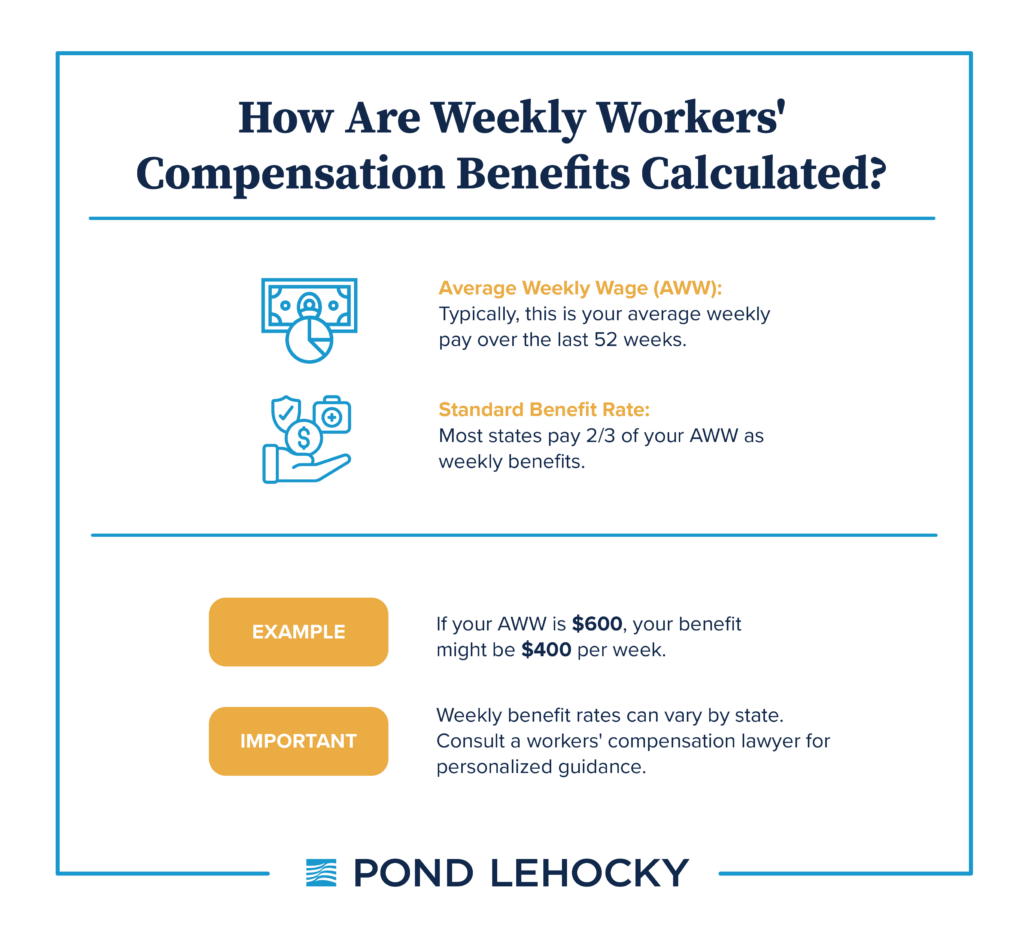Out of work due to an injury? Once you file your workers’ compensation claim, you will probably have questions about how your benefits will be calculated and how much money you will receive.
Workers’ compensation benefits provide financial coverage for medical expenses, ongoing care, funeral expenses, a portion of your lost wages, and ongoing care. Your employer provides these benefits to you through their workers’ compensation insurer. At Pond Lehocky Giordano, our attorneys represent injured workers and help them get the maximum benefits they need to provide for themselves and their families while they recover.
Understanding how workers’ compensation benefits are calculated can help you set realistic expectations about how you will take care of your finances while you recover from your injuries.
Factors that Impact the Amount of Workers’ Compensation You Can Receive
Not all injured employees receive the same amount of workers’ compensation benefits, nor will they all receive these benefits for the same period. Multiple factors affect the amount of compensation injured employees will receive.
- Severity of the injury. Minor injuries simply pay less in terms of workers’ compensation benefits, usually because they require less time missed from work and less extensive care. Severe injuries like amputations, fractures, and burns will require more time missed from work and more medical treatment.
- Wages and earning capacity. How much you earned before your injury is a determining factor in the amount of money you’ll receive from workers’ compensation. Likewise, your potential to continue earning that same amount of money if you can return to work is also a factor that determines how much you will receive from workers’ compensation.
- Duration of disability. The length of time you suffer from your disability directly impacts your compensation. Disabilities that take longer to heal or leave you permanently disabled usually result in higher payouts.
- State and local laws about workers’ compensation benefits. Specific state and local laws that govern workers’ compensation must be addressed when calculating disability benefits.
- Your preexisting medical conditions (if any). If you have preexisting medical conditions and your injury exacerbated them, you’ll need a thorough examination and continued monitoring to determine how your injury impacted your condition.
- Your employer and their insurer. Your employer has a legal obligation to treat you fairly under workers’ compensation laws in that their insurer must address your claim timely, and remain compliant during the review process. If you feel your employer and/or their insurer are treating you unjustly, contact us today to discuss your concerns and let us review your case.
These consolidations are not an exhaustive list, but are some of the most important factors that determine the total amount of compensation you may receive and the length of time during which you’ll be able to receive it.
How Long Can You Collect Workers’ Comp?
Workers’ compensation benefits will last until you meet one of the four possible outcomes listed below:
- Maximum medical improvement (MMI) is reached
- You have reached your state’s legal limit for weekly benefits.
- You return to work.
- You accept a settlement.
Reaching maximum medical improvement (MMI) means you’ve reached the point in your healing process that your condition has improved as much as it possibly can with medical care. In some cases, workers’ compensation insurance companies may offer you a settlement to end your claim around the same time you reach MMI. Having one of our qualified attorneys on your side to review the terms of a proposed settlement can help protect you from lowball offers and make sure you have the compensation you need for any additional care you may need.
Who Is Eligible for Workers’ Comp Benefits?
You are eligible for workers’ comp if you meet the following requirements:
- You are an employee.
- Your employer carries workers’ compensation insurance.
- You suffer an injury or illness that is work-related.
- You file a claim for benefits on time and per your state’s workers’ compensation rules.
Not all employees are eligible for workers’ compensation. Temporary employees, domestic workers, agricultural employees, and seasonal workers may not be eligible for benefits. Likewise, not all employers are required to carry workers’ compensation insurance, but most are.
Types of Workers’ Compensation Payments You Can Receive
There are four different types of workers’ compensation benefit payments you can receive. They include:
- Medical benefits
- Disability benefits
- Rehabilitation benefits
- Death benefits
Medical benefits include benefits that cover costs associated with the treatment and care of your injury or illness. Disability benefits are provided when you are injured or ill and unable to work. Rehabilitation benefits are available to help you return to work comfortably.
Death benefits are also available to survivors of loved ones who are fatally injured on the job.
Temporary Total Disability (TTD) vs. Permanent Partial Disability (PPD)
When you receive disability benefits, your disability will be classified as temporary total disability (TTD) or permanent partial disability (PPD). TTDs are disabilities that, although temporary, cause a total disability to the person. A person with a TTD is expected to be able to recover.
A person with a PPD has a disability from which they cannot recover, but the disability does not completely incapacitate them. A person with a PPD is still able to work, even if they are not able to perform the same job they had before their injury.
How Medical Benefits Are Factored into Workers’ Comp Payments
In some states, like New York, medical benefits are provided free of charge to workers’ compensation claimants. This means you don’t pay for treatment in your claim; your employer’s insurer pays for your care apart from your weekly compensation benefits.
How Vocational Rehabilitation Works
Vocational rehabilitation helps injured workers who can no longer return to their original jobs find gainful employment. Injured workers will have a liaison between them and their employer, who seeks to help the employee return to work in a different position or who helps the employee find a different job.
How State Laws Affect Workers’ Compensation
The state in which you live affects workers’ compensation benefits. Coverage requirements for each state determine which employers must carry workers’ compensation benefits and also determine the length of time during which you can receive benefits.
State guidelines also affect the maximum amount of benefits you can receive. Understanding your state laws can help you determine how much you may be eligible to receive.
Lump Sum Settlements Can Impact Workers’ Comp
If you agree to a lump sum settlement, your weekly benefits will discontinue. There are benefits and drawbacks to accepting a lump sum settlement, and a workers’ comp attorney can help you determine which is best for you.
Talk to a Lawyer if You Have Questions About Workers’ Compensation
At Pond Lehocky Giordano, we are dedicated to helping injured employees maximize the workers’ compensation benefits they receive. We believe you need coverage for your medical expenses, missed work, and your pain and suffering. With over 100,000 successful cases, our experienced attorneys are ready to put their knowledge to work for you.
To schedule a free, no-obligation consultation with our legal team, call 1-800-568-7500 or fill out our contact form today.



